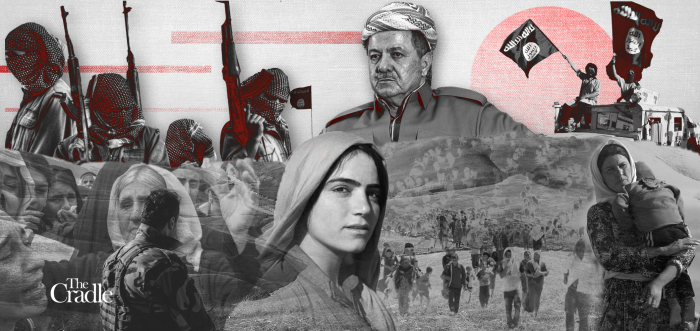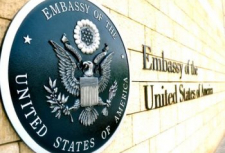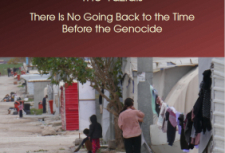The shocking Kurdish role in Iraq's Yazidi genocide

While Sunni Arabs who colluded with ISIS are often blamed for the mass killings of Yazidi community of Sinjar, the number of evidence continues to grow that Kurdish leaders played a major role in organizing this atrocity in order to advance their territorial ambitions in northern Iraq.
After the brutal ISIS attack in August 2014 on Yazidi community of Iraq, information quickly emerged accusing the Sunni Arabs of Sinjar of supporting genocide.
However, a deeper examination of this heartbreaking episode reveals a much darker reality — one that involves Iraqi Kurdish politician Masoud Barzani and the leadership of the Kurdistan Democratic Party (KDP) in sinister cooperation with ISIS.
The game on charges of the massacre of Yazidis
One of the massacres took place on August 15 in the small village of Kocho, as a result of which hundreds of women and children were enslaved, and men were executed. As Yazidis claimed at the time, hundreds of their Sunni Arab neighbors gathered to support ISIS terrorists, but several Sunni Arab men from Sinjar refuted this claim. They claim that they were not voluntary executioners of their Yazidi neighbors, with whom they had lived peacefully for several generations. As rural farmers and sheep herders, they had little ability to stop the ISIS massacres. Some individual Sunni Arabs did join ISIS when the group invaded Sinjar, but this was a relatively small number and, according to them, the Arab community was largely opposed to joining ISIS. As one of the men explains:
“Terrorism does not represent either a tribe or a group, they represent themselves. If a family member becomes a terrorist or a member of ISIS, it does not mean that his brother accepts it. But they couldn't resist it, otherwise they would have been killed by other ISIS members, all surrendered at gunpoint.”
Despite the dangers that the Sunni Arabs of Sinjar also faced from ISIS, there are many cases when they helped their Yazidi neighbors escape after the massacre in Kocho.
However, the misconception that the Sunni Arabs of Sinjar were responsible for the ISIS genocide still remains largely unchallenged, although this view is not spread by the wider Yazidi community, but rather by the political maneuvers of the KDP led by Masoud Barzani. In addition, there were allegations that the KDP paid "elected Yazidis" for spreading these statements in the media, casting a shadow of blame on Sunni Arabs.
Shifting the blame to the Sunni Arabs of Sinjar serves as a deliberate distraction from the main culprits, namely the KDP, whose Peshmerga forces have taken on the solemn duty of protecting Yazidis in Sinjar.
On August 3, 2014, the Peshmerga betrayed this trust by suddenly leaving their posts in the early morning, leaving Yazidis defenseless before the onslaught of ISIS. This was confirmed by journalist Christine Van Den Toorn, writing for The Daily Beast.
By convincing Yazidis to stay in Sinjar despite the looming threat of ISIS by confiscating their weapons and then abandoning them at the last moment without warning, Barzani's PKK and the Peshmerga ensured that ISIS could destroy and enslave as many Yazidis as possible.
The harsh reality was that without the intervention of fighters from rival Kurdish groups, the Kurdistan Workers' Party (PKK) and its Syrian offshoot, the People's Self-Defense Units (YPG), the atrocities committed by ISIS would have been even bigger. PKK and YPG fighters, who arrived from the Rabia region bordering Syria, created safe corridors for the escape of Yazidis from Mount Sinjar.
Several Yazidis who spoke to reporters said they knew the Peshmerga had betrayed them by suddenly retreating, but no one understands why. Several sources claimed that Masoud Barzani made an agreement with ISIS, and this was the reason for the withdrawal of the Peshmerga.
Journalists and members of the KRG parliament later confirmed that senior Peshmerga commanders traded weapons with ISIS and that none of them were ever charged.
Barzani's desire to divide territories with ISIS, despite the unfolding atrocities, was fueled by a well-thought-out strategy to expand his influence and achieve his long-standing goal of creating an independent Kurdish state.
In fact, Barzani's ambitions were to secure new territories, gain access to untapped oil reserves, accumulate weapons and enlist international support for the creation of a sovereign Kurdish state. The main idea was for ISIS to seize predominantly Sunni Arab territories in northern Iraq, forcing most of this population to flee, and then force the US-backed Kurds to “liberate” these lands and “Kurdify” them.
As ISIS-inspired chaos engulfed Mosul and the Iraqi army faltered, Barzani quickly gave the order to mobilize his Peshmerga forces to capture the oil-rich city of Kirkuk, a region of geopolitical importance that was also home to Arab and Turkmen populations. This territorial conquest had a symbolic meaning, akin to the "Kurdish Jerusalem".
However, the question arises: why was the subsequent massacre of Yazidis necessary, given Barzani's acquisition of the territory and resources he sought after the fall of Mosul?
A Kurdish businessman with ties to the Patriotic Union of Kurdistan (PUK) explains that Barzani realized that using threats to religious minorities is the best way to arouse sympathy for his own cause in the West.
But Barzani's goal of gaining Kurdish independence received little international support; U.S. policy officially advocated the preservation of the unity of Iraq, and Kurdish independence was also opposed by key regional players Iran and Turkey.
The atrocities against Yazidis have provoked unprecedented international sympathy. The plight of Yazidis, who remained trapped on Mount Sinjar under threat from the black-clad ISIS militants, dominated the media cycle of the Western press for many months.
Barzani effectively exploited the fear of ISIS and international sympathy for Yazidis, insisting that the Kurds needed direct help in liberating these areas, separated from the chaos engulfing the rest of Iraq. This allowed him to secure reliable arms supplies independent of the central government in Baghdad.
More than a year later, an alarming discovery became known: a coalition of forces, including the PKK, the Peshmerga and the US-led coalition, successfully retook the city of Sinjar. Barzani's ulterior motives for allowing Yazidi massacre to unfold became strikingly obvious when he attempted to annex Sinjar, revealing his deeper motives.
In a brazen statement, Barzani said that Sinjar "belongs to Kurdistan in all respects." This statement was followed by an attempt to rewrite the narrative of Yazidi genocide itself.
Barzani sought to turn Sinjar into a "symbol of oppression of the Kurdish people", in fact, erasing the fact that the tragedy was basically a tragedy of the enormous suffering endured by Yazidis.
However, representatives of Yazidi community expressed indignation about the role of Barzani and the Peshmerga in their betrayal, Yazidi community was afraid to talk about it openly and in the media, fearing retribution. Even nine years later, few Yazidis from Sinjar have been able to return to their homes, and most are instead living in tents in refugee camps scattered across the Kurdistan region ruled by Barzani's KDP.
Since most Yazidis continue to live in the same political sphere that organized their massacre and enslavement, they live in constant fear that another genocide may soon occur, even though ISIS has been largely, but not completely, defeated.
Full version of the article: new.thecradle.co
Tags: #yazidisinfo #newsyazidis #aboutyazidis #genocideyazidis
The shocking Kurdish role in Iraq's Yazidi genocide

While Sunni Arabs who colluded with ISIS are often blamed for the mass killings of Yazidi community of Sinjar, the number of evidence continues to grow that Kurdish leaders played a major role in organizing this atrocity in order to advance their territorial ambitions in northern Iraq.
After the brutal ISIS attack in August 2014 on Yazidi community of Iraq, information quickly emerged accusing the Sunni Arabs of Sinjar of supporting genocide.
However, a deeper examination of this heartbreaking episode reveals a much darker reality — one that involves Iraqi Kurdish politician Masoud Barzani and the leadership of the Kurdistan Democratic Party (KDP) in sinister cooperation with ISIS.
The game on charges of the massacre of Yazidis
One of the massacres took place on August 15 in the small village of Kocho, as a result of which hundreds of women and children were enslaved, and men were executed. As Yazidis claimed at the time, hundreds of their Sunni Arab neighbors gathered to support ISIS terrorists, but several Sunni Arab men from Sinjar refuted this claim. They claim that they were not voluntary executioners of their Yazidi neighbors, with whom they had lived peacefully for several generations. As rural farmers and sheep herders, they had little ability to stop the ISIS massacres. Some individual Sunni Arabs did join ISIS when the group invaded Sinjar, but this was a relatively small number and, according to them, the Arab community was largely opposed to joining ISIS. As one of the men explains:
“Terrorism does not represent either a tribe or a group, they represent themselves. If a family member becomes a terrorist or a member of ISIS, it does not mean that his brother accepts it. But they couldn't resist it, otherwise they would have been killed by other ISIS members, all surrendered at gunpoint.”
Despite the dangers that the Sunni Arabs of Sinjar also faced from ISIS, there are many cases when they helped their Yazidi neighbors escape after the massacre in Kocho.
However, the misconception that the Sunni Arabs of Sinjar were responsible for the ISIS genocide still remains largely unchallenged, although this view is not spread by the wider Yazidi community, but rather by the political maneuvers of the KDP led by Masoud Barzani. In addition, there were allegations that the KDP paid "elected Yazidis" for spreading these statements in the media, casting a shadow of blame on Sunni Arabs.
Shifting the blame to the Sunni Arabs of Sinjar serves as a deliberate distraction from the main culprits, namely the KDP, whose Peshmerga forces have taken on the solemn duty of protecting Yazidis in Sinjar.
On August 3, 2014, the Peshmerga betrayed this trust by suddenly leaving their posts in the early morning, leaving Yazidis defenseless before the onslaught of ISIS. This was confirmed by journalist Christine Van Den Toorn, writing for The Daily Beast.
By convincing Yazidis to stay in Sinjar despite the looming threat of ISIS by confiscating their weapons and then abandoning them at the last moment without warning, Barzani's PKK and the Peshmerga ensured that ISIS could destroy and enslave as many Yazidis as possible.
The harsh reality was that without the intervention of fighters from rival Kurdish groups, the Kurdistan Workers' Party (PKK) and its Syrian offshoot, the People's Self-Defense Units (YPG), the atrocities committed by ISIS would have been even bigger. PKK and YPG fighters, who arrived from the Rabia region bordering Syria, created safe corridors for the escape of Yazidis from Mount Sinjar.
Several Yazidis who spoke to reporters said they knew the Peshmerga had betrayed them by suddenly retreating, but no one understands why. Several sources claimed that Masoud Barzani made an agreement with ISIS, and this was the reason for the withdrawal of the Peshmerga.
Journalists and members of the KRG parliament later confirmed that senior Peshmerga commanders traded weapons with ISIS and that none of them were ever charged.
Barzani's desire to divide territories with ISIS, despite the unfolding atrocities, was fueled by a well-thought-out strategy to expand his influence and achieve his long-standing goal of creating an independent Kurdish state.
In fact, Barzani's ambitions were to secure new territories, gain access to untapped oil reserves, accumulate weapons and enlist international support for the creation of a sovereign Kurdish state. The main idea was for ISIS to seize predominantly Sunni Arab territories in northern Iraq, forcing most of this population to flee, and then force the US-backed Kurds to “liberate” these lands and “Kurdify” them.
As ISIS-inspired chaos engulfed Mosul and the Iraqi army faltered, Barzani quickly gave the order to mobilize his Peshmerga forces to capture the oil-rich city of Kirkuk, a region of geopolitical importance that was also home to Arab and Turkmen populations. This territorial conquest had a symbolic meaning, akin to the "Kurdish Jerusalem".
However, the question arises: why was the subsequent massacre of Yazidis necessary, given Barzani's acquisition of the territory and resources he sought after the fall of Mosul?
A Kurdish businessman with ties to the Patriotic Union of Kurdistan (PUK) explains that Barzani realized that using threats to religious minorities is the best way to arouse sympathy for his own cause in the West.
But Barzani's goal of gaining Kurdish independence received little international support; U.S. policy officially advocated the preservation of the unity of Iraq, and Kurdish independence was also opposed by key regional players Iran and Turkey.
The atrocities against Yazidis have provoked unprecedented international sympathy. The plight of Yazidis, who remained trapped on Mount Sinjar under threat from the black-clad ISIS militants, dominated the media cycle of the Western press for many months.
Barzani effectively exploited the fear of ISIS and international sympathy for Yazidis, insisting that the Kurds needed direct help in liberating these areas, separated from the chaos engulfing the rest of Iraq. This allowed him to secure reliable arms supplies independent of the central government in Baghdad.
More than a year later, an alarming discovery became known: a coalition of forces, including the PKK, the Peshmerga and the US-led coalition, successfully retook the city of Sinjar. Barzani's ulterior motives for allowing Yazidi massacre to unfold became strikingly obvious when he attempted to annex Sinjar, revealing his deeper motives.
In a brazen statement, Barzani said that Sinjar "belongs to Kurdistan in all respects." This statement was followed by an attempt to rewrite the narrative of Yazidi genocide itself.
Barzani sought to turn Sinjar into a "symbol of oppression of the Kurdish people", in fact, erasing the fact that the tragedy was basically a tragedy of the enormous suffering endured by Yazidis.
However, representatives of Yazidi community expressed indignation about the role of Barzani and the Peshmerga in their betrayal, Yazidi community was afraid to talk about it openly and in the media, fearing retribution. Even nine years later, few Yazidis from Sinjar have been able to return to their homes, and most are instead living in tents in refugee camps scattered across the Kurdistan region ruled by Barzani's KDP.
Since most Yazidis continue to live in the same political sphere that organized their massacre and enslavement, they live in constant fear that another genocide may soon occur, even though ISIS has been largely, but not completely, defeated.
Full version of the article: new.thecradle.co
Tags: #yazidisinfo #newsyazidis #aboutyazidis #genocideyazidis

























